Around the world, there is a growing appreciation of the unique needs of teenagers and young adults who have cancer. Unfortunately, there are still huge gaps in terms of their personalized psychosocial care. UNC Lineberger has teamed up with the Be Loud! Sophie Foundation to change that.
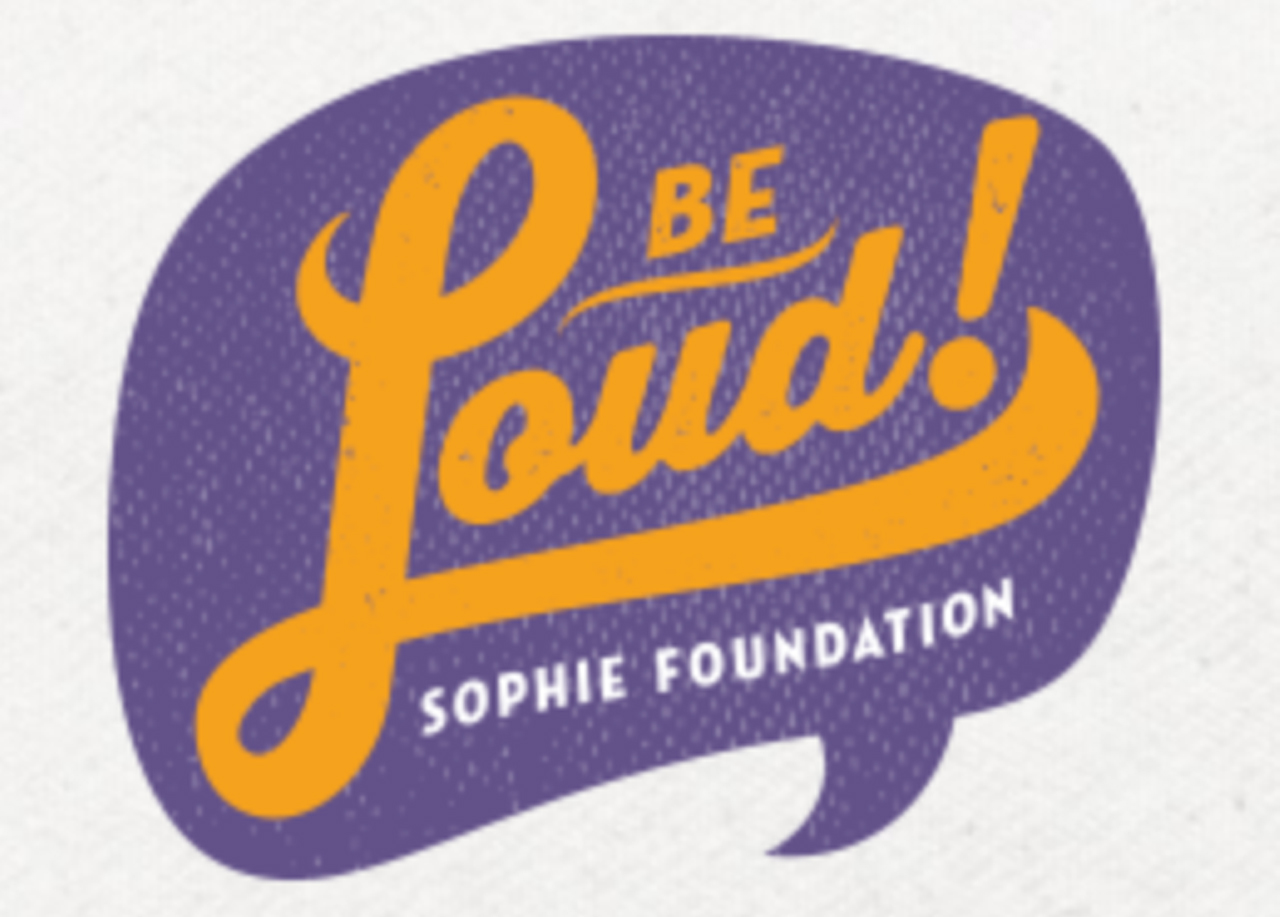
Being a teenager is tough. Now, imagine being a teenager and having to deal with a cancer diagnosis. Adolescent and young adult (AYA) cancer patients are not only in a stage of life where they’re discovering who they are, gaining independence from their parents and preparing for adulthood; they’re also having to deal with the pain, stress and confusion that accompanies a life-changing cancer diagnosis.
Around the world, there is a growing appreciation of the unique needs of teenagers and young adults who have cancer. Unfortunately, there are still huge gaps in terms of their personalized psychosocial care. UNC Lineberger has teamed up with the Be Loud! Sophie Foundation to change that. The Be Loud! Sophie Foundation is a local organization established in memory of Sophie Steiner. Diagnosed with germ-cell cancer at age 14, Sophie spent months undergoing treatment at UNC Lineberger. An energetic, sharp young woman, it did not take long for Sophie to recognize that, while she was receiving the best care available, there was nothing specifically designed for people her age. This absence of resources in tailored care for adolescent and young adult patients — those ages 13 to 26 — is something the National Cancer Institute has referred to as a “no man’s land.“
The Advocate: Lauren Lux
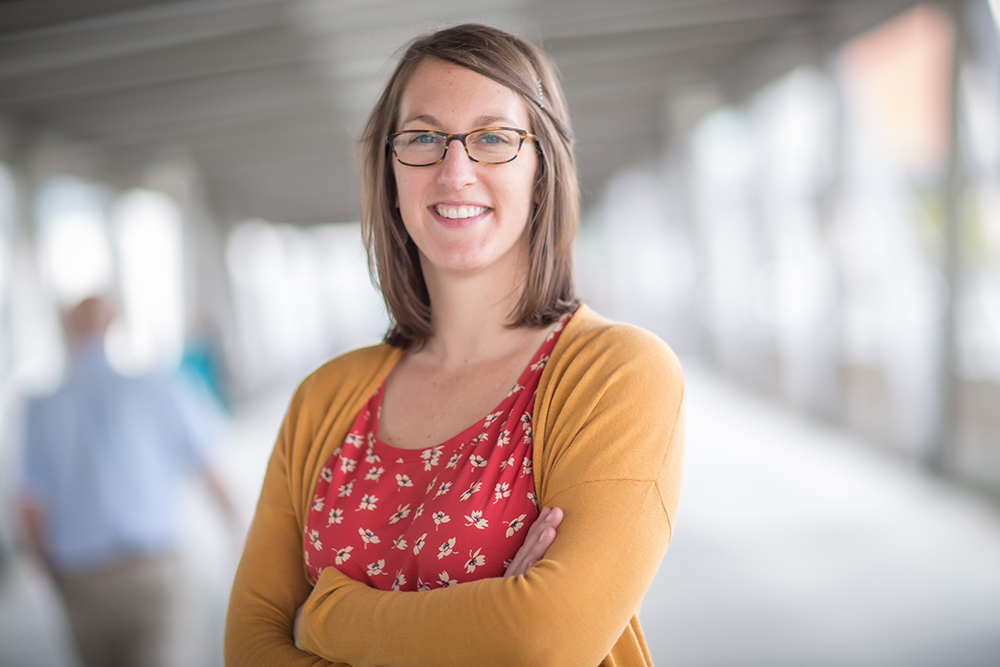 In 2015, UNC Lineberger created a unique role at the N.C. Cancer Hospital to bridge this gap, a position dedicated to designing support programs and providing resources to this demographic. The Adolescent and Young Adult Program began, and Lauren Lux, a licensed clinical social worker who understands the unique needs of this specific patient population, was hired as director.
In 2015, UNC Lineberger created a unique role at the N.C. Cancer Hospital to bridge this gap, a position dedicated to designing support programs and providing resources to this demographic. The Adolescent and Young Adult Program began, and Lauren Lux, a licensed clinical social worker who understands the unique needs of this specific patient population, was hired as director.
Lux says Sophie Steiner’s experience of not quite fitting in is typical among many AYA patients in the United States. “It’s a tough group because they’re not kids, and they’re not adults,” she says. “They don’t necessarily feel at home in a pediatric world, and they don’t really feel at home in an adult world. My main objective is to help this patient population maintain their identity and their dignity.” With a focus on personhood and humanness, Lux has begun to design programs that support these patients in a way that reminds them of what they love about life. “One of the goals we have is that cancer will become a part of the patient’s narrative,” says Lux. “But it won’t become all of it.”
The Donors: The Steiner Family
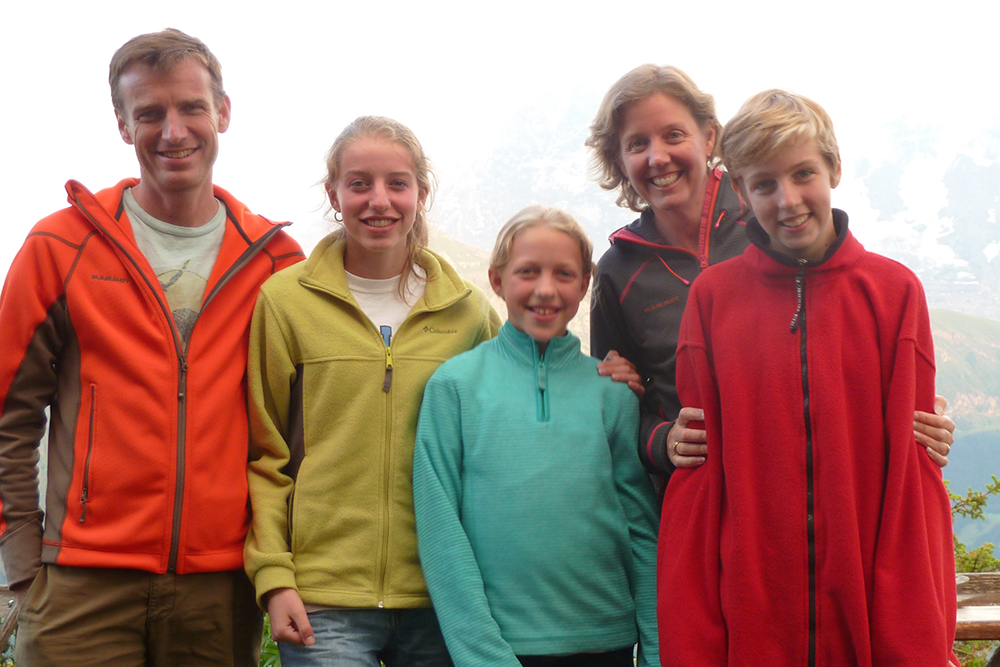 Two years after Sophie’s death, her parents, Lucy and Nicklaus Steiner, and her sisters Elsa and Annabel have fulfilled the first major goal of the Be Loud, Sophie! Foundation they started in her honor: working with UNC Hospitals and UNC Lineberger to hire an AYA program director. But they are far from finished. Together with UNC, they now have the chance to support a research-based program that advances the national understanding of how best to meet the unique needs of patients within the AYA demographic.
Two years after Sophie’s death, her parents, Lucy and Nicklaus Steiner, and her sisters Elsa and Annabel have fulfilled the first major goal of the Be Loud, Sophie! Foundation they started in her honor: working with UNC Hospitals and UNC Lineberger to hire an AYA program director. But they are far from finished. Together with UNC, they now have the chance to support a research-based program that advances the national understanding of how best to meet the unique needs of patients within the AYA demographic.
“When we started our foundation, we based our goalsetting on our own personal experiences with Sophie,” explains Niklaus. “But we also realized that our perspective was limited, because every child is different and needs different things. However, there is one common thread among this special patient population: they all want institutional understanding and support of who they are as individuals. These kids know who they were before cancer, and they want to continue being themselves. That’s what Sophie wanted.”
Cancer is a unique diagnosis because a cancer patient’s health can quickly change from one hour to the next. That’s especially hard on a young person who is seeking steadiness as they are going through the maturing process towards adulthood. “It can be a blow to one’s sense of self, but we believe that UNC’s AYA program will help lessen those feelings by enabling these teens and young adults to experience the milestones every young person goes through,” says Lucy. “And ideally, once they are in remission, they can say, ‘I will face the rest of my life with positive energy, because if I can get through cancer, I can face anything. I will not live in fear, but with strength.’”
The Steiners are extremely pleased that Lux is leading the AYA efforts, saying she has a personality that is attractive to teens and serves as an advocate for them. “We’ve encouraged Lauren to identify program needs as they evolve, and just since October 2015, she’s accomplished a great deal,” Niklaus says. “She’s setting research goals, developing assessment tools to evaluate the program’s effectiveness, and providing internal support to clinicians as they learn more about caring for this age demographic. She’s terrific, and it’s a pleasure working with her.”
The Patient: Melody Kessler, 23, Hodgkin’s lymphoma
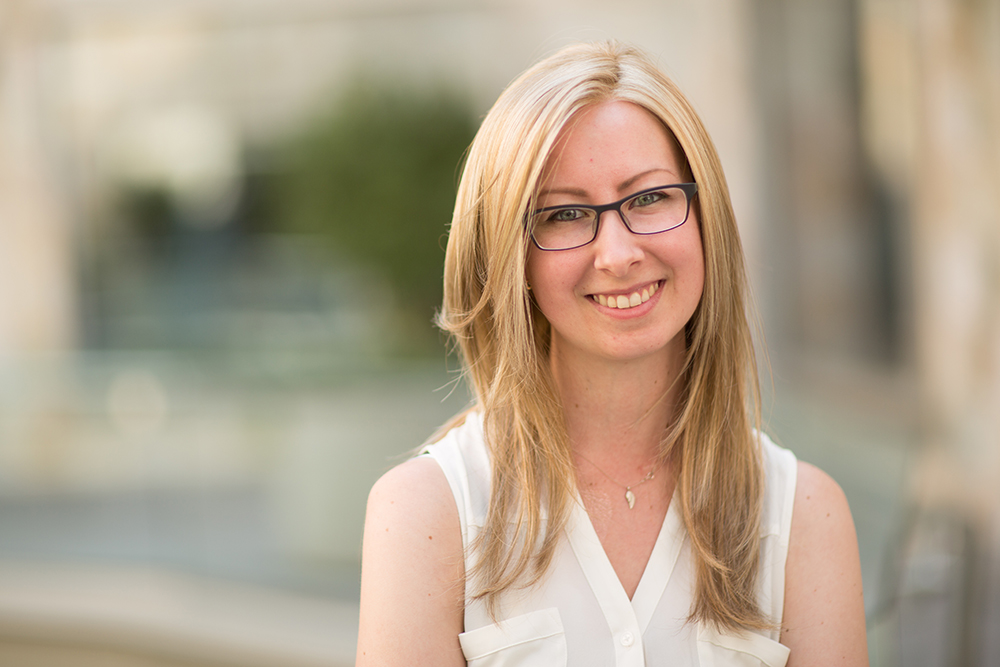 Melody Kessler slowly turns her wedding band on her left hand as she sits in an infusion chair at the N.C. Cancer Hospital. Her husband, Calvin Deutschbein, hands her a water bottle and encourages her to keep drinking. “You need to stay hydrated,” he says. The two are waiting for Melody’s regularly-scheduled blood work to come back from the lab in preparation for her regularly-scheduled chemotherapy treatment.
Melody Kessler slowly turns her wedding band on her left hand as she sits in an infusion chair at the N.C. Cancer Hospital. Her husband, Calvin Deutschbein, hands her a water bottle and encourages her to keep drinking. “You need to stay hydrated,” he says. The two are waiting for Melody’s regularly-scheduled blood work to come back from the lab in preparation for her regularly-scheduled chemotherapy treatment.
Melody and Calvin met in middle school in their hometown of Loveland, Colorado, where they became fast friends as members of the MathCounts team. Their friendship bloomed into romance, and they dated throughout high school and college. The couple became engaged, but their excitement was short-lived. On December 30, 2014, Melody was diagnosed with Hodgkin’s lymphoma.
“I had a lump in my neck behind my clavical and experienced a continual rash and itchiness for about a year, but I didn’t think it was cancer,” says Melody. “It was a shock, to say the least.”
Melody was treated at University of Colorado Health, where she underwent six months of ABVD, the first line chemotherapy for Hodgkin’s lymphoma. On average, ABVD cures approximately 80 percent of patients who receive it. Melody’s treatment was successful, and after going into remission, she and Calvin married on August 8, 2015. They moved to Chapel Hill to attend graduate school in August 2015.
Melody had been in remission about four months when she had a PET scan at UNC in October 2015. “My doctor, Steven Park, MD, said the results didn’t look good,” Melody explains. “He did a biopsy, which came back negative, so he decided to do another PET scan in January of this year. The cancer had come back.”
Another round of treatments began in March, this time a form of chemotherapy called “ICE,” which lasted 12 weeks. Her scans showed improvement, but she wasn’t in remission yet. “There was still some disease that was chemo-resistant,” says Melody. “So Dr. Park started me on another treatment called GVD, which is used to treat patients who have relapsed after remission from Hodgkin’s disease. I’m thrilled to say that after chemo, I am now cancer-free! I will have a stem cell transplant this fall.”
“When I met Lauren, she asked me about my experiences as an AYA patient, and I told her it’s tough being this age and having cancer. I want to be respected and heard, because my voice matters. I may be young, but I’ve done more thinking about my mortality than most 60-year-olds. I really appreciate that UNC has a person like Lauren who’s dedicated to helping me through my cancer journey at this particular stage of my life. I know she’s in my corner.”
The Patient: Ethan Johnson, 16, Philadelphia Chromosome-Positive Acute Lymphoblastic Leukemia
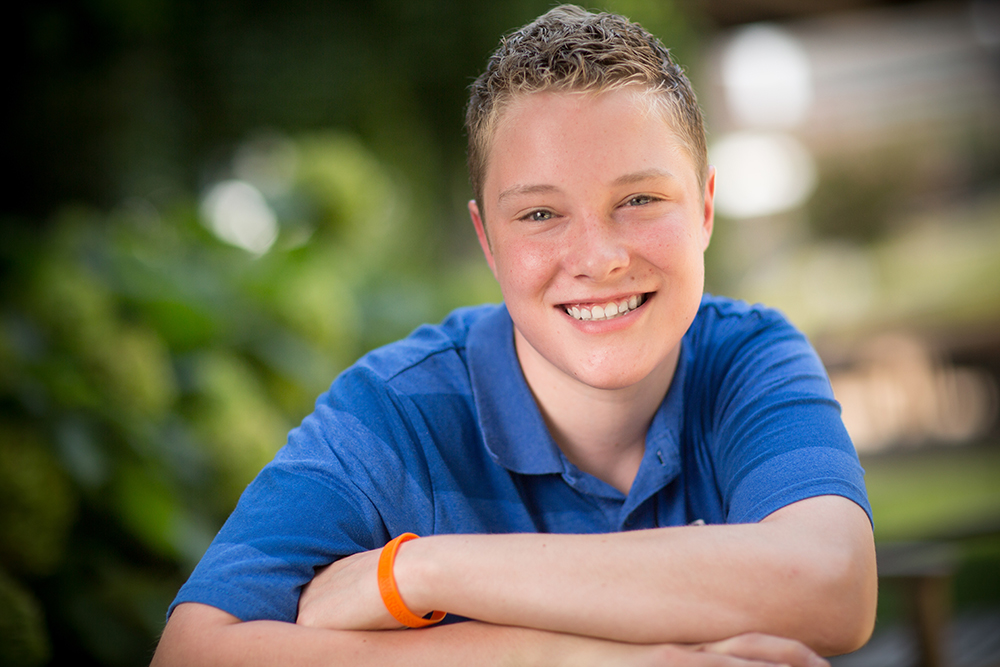 To look at Ethan Johnson, you’d never know he’s been fighting a two-year battle with cancer. His blond, curly hair has grown back, and his pale skin now has a healthy glow thanks to a bit of summer sun. His appetite has returned, so he’s been eating lots of pasta lately. “Spaghetti’s my favorite,” he laughs. “I never get tired of it.” He looks like an ordinary teenager.
To look at Ethan Johnson, you’d never know he’s been fighting a two-year battle with cancer. His blond, curly hair has grown back, and his pale skin now has a healthy glow thanks to a bit of summer sun. His appetite has returned, so he’s been eating lots of pasta lately. “Spaghetti’s my favorite,” he laughs. “I never get tired of it.” He looks like an ordinary teenager.
But the last two years have been anything but ordinary for the Johnson family. What started as an annual physical at his pediatrician’s office turned into a nightmare on October 19, 2014, when Ethan was diagnosed with Philadelphia Chromosome-Positive Acute Lymphoblastic Leukemia (Ph+ ALL).
“We were blindsided, because Ethan hadn’t been sick, and he had no symptoms. But multiple blood tests showed his counts were really high,” says his mother, Sharon. “We came to UNC that Sunday, and Ethan immediately began chemotherapy treatments that same evening. My husband Rick and I asked lots of questions because we didn’t know anything about Ethan’s disease.”
Pediatric oncologist Patrick Thompson, MD, explained that Ph+ ALL is a rare chromosomal form of leukemia, and that Ethan and his family were at the beginning of a long, hard journey. And Thompson was right. Ethan soon lost his hair, and he was frequently nauseous or sick due to the many medications he took. Since he was unable to attend school, he missed being with his friends, and he was concerned about falling behind in his academics.
“My parents arranged to have a homebound teacher work with me three hours a week,” Ethan explains. “But otherwise, my mom has become my teacher, classmate, principal, and school bully! Fortunately, I’ve been able to keep up with my classmates and have made the honor roll each quarter. I was invited to join the National Honor Society last semester, so I’m pretty proud of that. My favorite subject is medical science, and I think I’d like to pursue a career in the medical field.”
Even though he’s performed well in school, Ethan has missed doing all the typical things teenagers do, like skateboarding, going to the movies, and attending school activities. But his stay in the N.C. Cancer Hospital has produced some unexpected surprises.
“Dr. Thompson and I have a great relationship,” says Ethan. “I’m comfortable asking him anything, and I trust he will always tell me the truth. All of the doctors and nurses have been super nice. I really miss the fifth floor nursing staff since my treatment doesn’t require hospitalization anymore and I’m in the maintenance phase of my care. I’ve been lucky to find a great friend who is also a patient and has the same diagnosis I do. His friendship has really helped because we feel exactly the same about this whole experience. Our moms get us together as much as possible, and we Skype to play video games together and text a lot.”
Although Ethan’s road to recovery isn’t over, the Johnson family continues to move forward and has become closer as a result of his illness. “I have a lot of nervousness about the unknown, and at times, I’ve been scared I was going to die,” Ethan says quietly. “But my parents have really helped me through those worries. They tell me they chose my name – Ethan Asher – because it means ‘strong and happy,’ so I try to be. I have faith that God will take care of me and help me through this part of my journey.”
The Patient: Damonte Stackhouse, 19, Acute Lymphoblastic Leukemia (ALL)
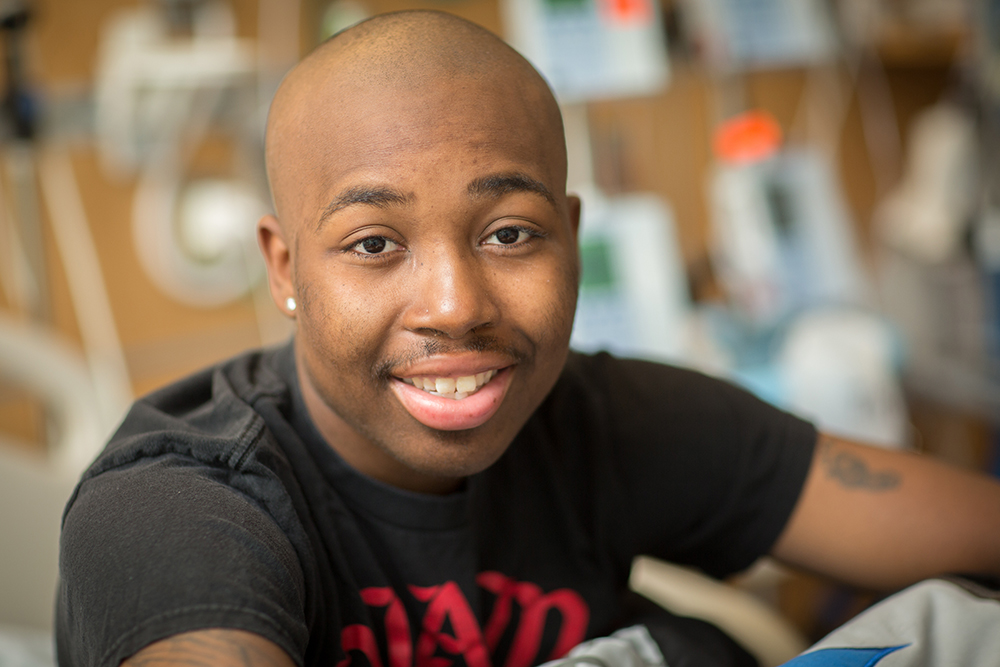
There’s the saying that, ‘Plans are made to be broken.’ But according to Damonte Stackhouse, his plans haven’t been broken by cancer; they’ve just been put on hold.
In November 2015, Damonte wasn’t feeling well and went to his local emergency room in Fayetteville, N.C. After extensive testing, he was transferred to the N.C. Cancer Hospital, where he was diagnosed with Acute Lymphoblastic Leukemia (ALL).
“I felt this wave of emotions: shock, hurt, worry, anger. I just couldn’t believe it,” Damonte says. “I didn’t know anything about the disease; in fact, I didn’t even think cancer was real. When they told me I have ALL, I was afraid I was going to die.”
Damonte’s oncologist, Katarzyna Jamieson, MD, has been with him every step of the way, through multiple rounds of inpatient chemotherapy, as well as a recent bone marrow transplant. “She told me the treatments would make me very sick, but until you actually go through it, you just don’t realize how difficult it will be,” he explains. “My hair fell out, I lost weight, I had no energy…it was really awful.”
The effects of cancer have been more than just physical for Damonte. He says feelings of isolation – of being away from family, friends and home – were beginning to overwhelm him. That is, until Lauren Lux stepped in. “Lauren listened to me, and she understood my frustration about having to stay in the hospital for such a long time, disconnected from my life and the people I love,” says Damonte. “She’s been a great sounding board when I’ve needed a friend. Plus, she’s done some really nice things for me, like surprising me with my favorite meal for dinner, taking walks with me, even providing gas cards through the Be Loud, Sophie! Foundation so my girlfriend, De’Sha, could come visit me while I’m in the hospital. Her kindness has been very encouraging.”
In the world of cancer, a patient’s transplant day is called ‘Day 0’. That’s when the countdown began for Damonte to go home. So after four weeks in the hospital, he’ll be required to stay in Chapel Hill near UNC as an outpatient for another two months since that’s when he’s at the highest risk for infection. His home-away-from-home will be the SECU Family House, and if all goes according to plan, he’ll be home for the holidays.
Although Damonte has struggled with the loss of his independence during his illness, he says the time he’s spent at the N.C. Cancer Hospital has given him a new perspective on life. Prior to his illness, he had been at a crossroads, not sure whether he wanted to attend college or to enlist in the U.S. Navy. But during the quiet moments in his hospital room, Damonte decided it’s time to get serious about his future. “I want to continue my schooling and enroll in community college so I’ll have career options. Cancer has definitely caused me to re-evaluate my life, and I don’t want to waste any more time.”
